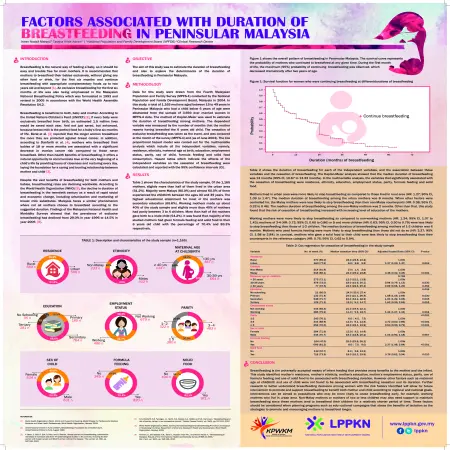Browse by Type
Results for Item type : "Scientific Poster"
|
|
Factors associated with duration of breastfeeding in Peninsular Malaysia
Item Type: Scientific Poster
Editor:
Year: 00/00/2015
Abstract: Breastfeeding is the natural way of feeding a baby, so it should be easy and trouble free for most mothers. It is recommended that mothers to breastfeed their babies exclusively, without giving any other food or drink, for the first six months and continue breastfeeding with appropriate complementary foods up to two years old and beyond [1]. An exclusive breastfeeding for the first six months of life was also being emphasized in the Malaysian National Breastfeeding Policy which was formulated in 1993 and revised in 2005 in accordance with the World Health Assembly Resolution 54.2. Breastfeeding is beneficial to both, baby and mother. According to the United Nations Children’s Fund (UNICEF) [2], if every baby were exclusively breastfed from birth, an estimated 1.5 million lives would be saved each year. And not just saved, but enhanced, because breast milk is the perfect food for a baby’s first six months of life. Beral et al. [3] reported that the longer women breastfeed the more they are protected against breast cancer. In addition, according to Danforth et al. [4], mothers who breastfeed their babies of 18 or more months are associated with a significant decrease in ovarian cancer risk compared to those never breastfeed. Other than health benefits of breastfeeding, it offers a natural opportunity to communicate love at the very beginning of a child’s life by providing hours of closeness and nurturing every day, laying the foundation for a caring and trusting relationship between mother and child [2]. Despite the vast benefits of breastfeeding for both mothers and babies, breastfeeding rates are declining worldwide. According to the World Health Organization (WHO) [5], the decline in duration of breastfeeding in the twentieth century as a result of rapid social and economic change, including urbanization and marketing of breast milk substitutes. Malaysia faces a similar phenomenon where not all mothers choose to breastfeed according to the suggested duration. Findings of the Malaysian National Health and Morbidity Surveys showed that the prevalence of exclusive breastfeeding had declined from 29.0 % in year 1996 to 14.5 % in year 2006 [6]. Objective: The aim of this study was to estimate the duration of breastfeeding and also to explore the determinants of the duration of breastfeeding in Peninsular Malaysia.
|
|
|
|





